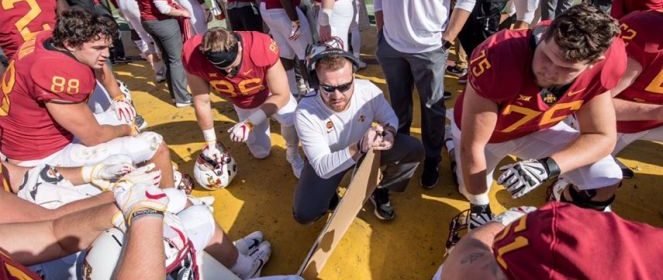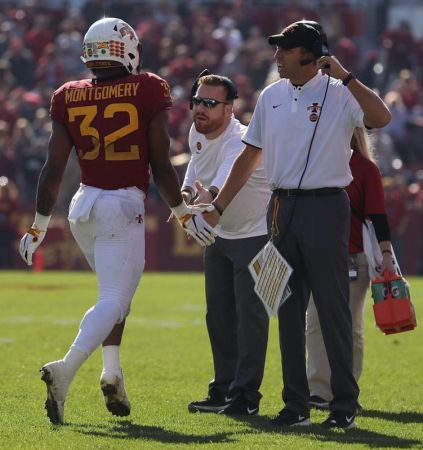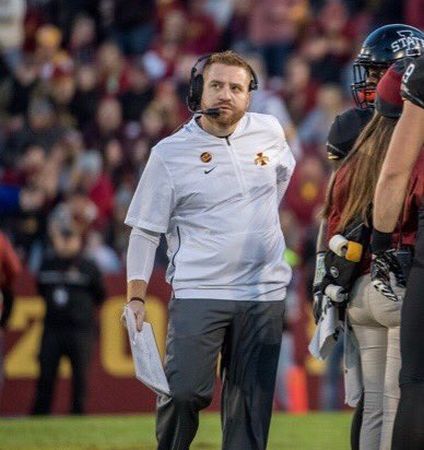Interview: Iowa State Recruiting Coordinator Alex Golesh Gives Inside Look to Cyclones Recruiting

Written by Ryan Wright
Twitter: @RyanWrightRNG
There may not be a more impassioned college football fanbase deserving of a consistently high-achieving team than the Iowa State loyalist. In the late 1970’s, the Cyclones appeared to be a team ready to take the proverbial turn under then head coach Earle Bruce only to be letdown. The faithful waited patiently seeing another uprising in the early 2000’s with Dan McCarney at the helm but not to the level of taking home conference titles. Now, the Cyclones have the look and feel of that team ready to challenge in the Big 12, and that all comes down to coaching, setting the culture, and recruiting top athletes that fit the schemes. Thanks to head coach Matt Campbell, recruiting coordinator Alex Golesh, and the entire Cyclone coaching staff, Iowa State fans are believing again and for good reason.
It only took Matt Campbell one season to turn ISU from a 3-9 team (2016) into a winning program. In back-to-back seasons, ISU has posted an 8-5 record with impressive wins in 2017 over then- No. 3 Oklahoma (38-31) and No. 4 TCU (14-7) and victories over No. 25 Oklahoma State (48-42) and No. 6 West Virginia (30-14) a year ago. Now the fanbase has reason to believe the best is yet to come. But great coaches are only as good as the talent they have on the roster. At that talent on the Cyclones roster is ascending.
The coaching strategy and team culture is set from the top down, with the recruiting for Iowa State being managed by Alex Golesh. With Coach Golesh and Coach Campbell having roots dating back to their days on staff as assistants at Toledo (2009-11), the duo knows what they want and how to build a team into a winner. Coach Golesh has delivered a level of talent to Ames beyond any previous efforts. And that continues, the 2020 class if off to a great start with 15 verbal commitments ranked No. 37 nationally by 247Sports.
To see how ISU puts together a class and what they look for in a given recruit, I sat down with Coach Golesh for an in-depth interview going into the coach’s mindset on securing talent for Cyclone Nation.
Interview
Alex, how long have you been coaching at the college ranks?
“I have been coaching in college since 2004; that was my first year as a student coach. I am going into Year 15.”
What inspires you as a coach to get up and get after it each day?
“Oh man. I like working with young people and seeing them succeed. Being a part of a team, that is something everyone is looking for. Another part of it is the coaching staff – doing it with guys you like is a lot of fun.”
As the recruiting coordinator for Iowa State, what is the CliffsNotes version of your responsibilities with the Cyclones?
“From a coaching side, I am coaching tight ends and our special teams. I work really closely with our director of player personnel, Derek Hoodjer. We help with recruiting based on the head coach’s direction. I oversee the marketing and social media side of everything along with the overall vision of how we want to sell and market ISU football. On the personnel side, the director of player personnel oversees all the inhouse work. I handle the full-time coaches and help them with their recruiting as well.”
With the needs of each class varying, how do you breakdown the importance of various positions to the rest of the coaching staff as focus in recruiting for a given year?
“There are two ways to look at it, the first is never turn down a good player regardless off position. We treat the offensive and defensive linemen that way. After that, we are looking at talent holes on the roster. We try not to look at “X” amount at each position because you can get pigeon holed with your recruiting that way. We have a general idea of the numbers at each position and what we may need. We look at who we are graduating at different positions and we look to see if we have a young guy in the program that can replace him. If not, how do we attack recruiting that position? Do we need a high school player, a junior college player or are we looking at a transfer or grad transfer to fill that need?”
Regardless of the position you are recruiting, what are some of the basics you look at when scouting a high school player from the physical to the classroom?
“I think the first thing that has to jump out is the film or the live evaluation. Something has to grab your attention and make you fall in love. His athletic ability is typically the first thing. After that, we start to dig. Where we are as a program, after inheriting a program needing to be rebuilt, we came in ready to fix everything with an overhaul of everything. We needed to change the culture and athletic talent on the roster. Since we’ve been here, we are building the new locker rooms and putting more importance on the athletic side.

“Athleticism has to jump off the screen for a recruit, beyond that it has been more about culture and fit. I know that is used a lot, but we make sure a guy protects our culture and is not disruptive to the team. We are looking for a team-first guy not a selfish guy. That is the No. 1 after falling in love athletically. We put a lot of stock into that more so than anywhere else. We have to win in the margins at ISU.
“With academics, that helps separate two guys in the same realm. If one is really good academically, and he has not missed school or is not tardy to class, that helps separates recruits. You have to be intelligent to play this game given how everything is now in college football. It is super important to fit into the culture and charter. It is important to be able to handle how fast things are moving in practice. You have to learn and go on to the next play. Recruits have to have a passion for the game at this level.”
What are some of the key traits to a player you look for on offense that fits the Cyclones’ scheme?
“On offense in our scheme, we never have talked about being a certain model. We are a blend. We run a multiple front Spread and we can go high-tempo. We can line up big and slow things down. We have made a living on running the football and playing with big receivers on the outside. But it all starts up front with offensive line. We like recruiting tough and gritty guys. Measurables not as important as being tough and gritty. At receiver, we have made a living with big receivers. That has been our niche. It is always important to have good tight ends – tight ends with length, who are smart and are tough guys. The running back position has been a big reason for our success. It helps if you have a good quarterback.
What about on defense? What are you looking for on that side of the ball?
“We look at it very similar to our offense. It all starts up front. We build from the middle working out; the defensive tackles to inside linebackers and then to the safeties. We try to be strong up the middle. Similar to our offense, we have built around our personnel. The way college football is played today, it is best to get top players regardless of position and not pigeon hole this is who we are. You have to adjust to what you have because you can’t draft and you can’t trade for players. You have to adjust to the players on both sides of the ball.”
With your years in the game, is there one position that maybe the hardest to project a player’s progress from high school to Power 5 football?
“I think there are two, and tight end is one of them.”
What makes a tight end tough to project?
“Partially because there are so many things he has to do in our offense. Tight ends are asked to do so much in our offense; it takes time to learn the position. It can be hard to project a young guy. It is hard to tell if he can gain and sustain the weight, and if he can handle the position.”
And the second spot?
“Quarterback. Being a quarterback is more than throwing the football. People get caught up in if he can sling it. There is more to it than that. Those two are the hardest positions to gauge in recruiting.”

For the recruits and their parents reading this, what are some of the “do not dos” for players in the recruiting process?
“In terms of not recruiting that guy, the academics will knock him out fast. If you cannot make it with the NCAA clearing house and you are tardy and have absentees on your record, we will steer away fast.”
What about how recruits handle their social media?
“Some pointers I have picked up over the years for recruits, the first contact on a lot of guys is through social media. It helps if your name is what your name is on Twitter. Same on Instagram. It makes it easier if your name is actually your name on your handle. It helps to have a clean media account, but that does not mean you cannot have friends on social media. It is fun to see their personalities on social media. But you have to be smart with what you like and retweet. When you are recruiting, you look for reasons to cross guys off the list. You don’t want guys who could hurt your culture. With social media, it is easier to see that now.
“The last part to share with recruits, don’t forget the value your high school coach has in your recruiting. The high school coach is the top recommendation in the process for us. Coach Campbell’s dad was a high school coach. We grew up around top high school coaches. You cannot undervalue that. Services and combines can get your foot in the door, there are a lot of ways you can get you in front of a coach, but your high school coach has to sign off on it. For us, that is the most valuable part in your recruiting. Parents need to know that as well.”
What are some of the things you like seeing from players as you are recruiting them?
“Honesty and being upfront. The guys that know what they are looking for, it makes it easier to recruit them. Things like what they want to study, where they want to go to school, what they are looking for in a college program. Everyone is in different phases in life so it is not always easy. Some recruits do not have help going through and onto the next step in their life. If they have a strong support system, it makes it easier for them and us. There is nothing more frustrating than talking to a guy, hearing he is looking for a good coach; good coaches are everywhere in college football. If guys that have thought through what they are looking for it makes it easier to recruit them. Being honest throughout the process helps both sides in the recruiting process.”
For those of us that have never experienced a National Signing Day from a collegiate coach’s perspective, what is that like?
“It has changed. It used to be more guys deciding on that day. Now, with the early signing period, you have an idea on everyone you are signing. With the early signing date over the last two years, we have been getting ready for a bowl game. That has been our priority to focus on the bowl game during that time and into the dead period. You know who all will sign.
“When there is a young man out there who has not announced, that keeps you on the edge of your seat. But if you have done everything you can on a recruit, that signing day is more of a celebration for the kids, their school, and their teammates. We don’t have the same nervousness about National Signing Day as we used to because of the changes. From within, we are so excited to welcome new members to our team. With kids being able to commit earlier, if they wait and announce on National Signing Day you typically know they are coming. You do breathe a sign of relive with the last National Letter of Intent comes in.”
When a class is finalized at the end of the day on the first Wednesday in the new year, what in your opinion defines a great recruiting class?
“I think the main thing is feeling like you filled the voids needed with the gaps you needed to close; you remain optimistic. With a recruiting class, you wait two to three years to find out if you won. The exciting part is looking back to see where we hit on all these guys. You want to be at 90 percent in the class with contributing members to our program. If anyone tells you differently, they are lying. If you fill your holes, got better, and have continual growth, that is the end goal. The goal is to get better at each spot with a better program on National Signing Day. But you wait to evaluate a class for two to three years to see where you ended up.”
Any last words of encouragement or advice for those going through the recruiting process?
“My advice to recruits, look for people that are honest in the recruiting process. There is a lot of hype and selling of things with recruiting. Everyone wants to show facilities and jerseys, but what about the other days in the year. You are guaranteed 12 game days, there are 353 days left in the year. What are those days like? Who do you want to be around the other 353 days of the year and who do you want to help you grow in the tough moments? Recruiting has been jacked up that way with the overselling of programs. You should look at who can help you through the tough times – the hard times in winter conditioning when there are no crowds or uniforms, not just the 12 days of the year playing the games.”
Alex, I appreciate your time today and wish you and the ISU program continued success on the recruiting trail and with the upcoming 2019 season.
“Thank you.”
Alex Golesh’s Coaching Experience
2003 – Westerville Central (OH) – Assistant
2004-05 – Ohio State – Student Assistant
2006-07 – Northern Illinois – Graduate Assistant
2008 – Oklahoma State – Graduate Assistant
2009-11 – Toledo – Running Backs, Recruiting Coordinator, and Specialists
2012-13 – Illinois – Tight Ends, Recruiting Coordinator, and Specialists
2014 – Illinois – Running Backs, Tight Ends, and Recruiting Coordinator
2015 – Illinois – Tight Ends and Special Teams Coordinator
2016-Present – Iowa State – Tight Ends and Recruiting Coordinator
Photo credit: ISU program; Alex Golesh
